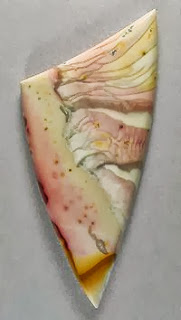I was unfamiliar with Willow Creek Jasper until recently. Found only in Idaho, it's part of a family of porcelain jaspers (including Bruneau, Carrasite, Deschutes, Hart Mountain., Morrisonite, Imperial, Succor Creek, and Mookaite, just to name a few).
Here's a particularly stellar example:
The moniker refer sto the way these gems take a very high-gloss finish or polish, and can be mistaken for porcelain ceramics. Willow Creek, in particular, is known for its range of soft colorings, browns, grays, greens, yellows, pinks. Sometimes it's a little *too* subtle for me. I actually don't like a lot of Willow Creek jasper...but as usual, when I do like it, I like the best (and often expensive), the unusual, the dramatic.
Here's one of my Willow Creeks:
It's hard to see the glossy shine from this angle but you certainly can see the colors!
I tried another angle, but the shine is hard to pick up on camera.
I've been holding on to my 2012 purchases. Not for any special reason, but the colors are a bit different than what I usually use, and some gems just need to sit with me for a while before I have a plan for them. I did set one recently:
With wire embellishments that echo the patterns in the stone. This is one of the most amazing examples I've seen in person and I had to take it home. :)
This jasper is found inside Thunder Eggs. What?? Thunder Eggs, usually baseball-sized, form in layers of volcanic ash. Like a geode, but not geodes (geodes have hollows within them and often crystals), they must be cut open to (hopefully) reveal their treasures: deposits of jasper, agate, or opal, which can then be cut into cabochons.
Why Willow Creek? That I don't know. Many jaspers are named after the area where they're found...I guess it was more descriptive than "Idaho jasper". :)
The pendant above sold almost immediately and I guess I'll keep my eyes open for some more on my next gem shopping trip!
Here's a particularly stellar example:
The moniker refer sto the way these gems take a very high-gloss finish or polish, and can be mistaken for porcelain ceramics. Willow Creek, in particular, is known for its range of soft colorings, browns, grays, greens, yellows, pinks. Sometimes it's a little *too* subtle for me. I actually don't like a lot of Willow Creek jasper...but as usual, when I do like it, I like the best (and often expensive), the unusual, the dramatic.
Here's one of my Willow Creeks:
It's hard to see the glossy shine from this angle but you certainly can see the colors!
I tried another angle, but the shine is hard to pick up on camera.
I've been holding on to my 2012 purchases. Not for any special reason, but the colors are a bit different than what I usually use, and some gems just need to sit with me for a while before I have a plan for them. I did set one recently:
With wire embellishments that echo the patterns in the stone. This is one of the most amazing examples I've seen in person and I had to take it home. :)
This jasper is found inside Thunder Eggs. What?? Thunder Eggs, usually baseball-sized, form in layers of volcanic ash. Like a geode, but not geodes (geodes have hollows within them and often crystals), they must be cut open to (hopefully) reveal their treasures: deposits of jasper, agate, or opal, which can then be cut into cabochons.
Why Willow Creek? That I don't know. Many jaspers are named after the area where they're found...I guess it was more descriptive than "Idaho jasper". :)
The pendant above sold almost immediately and I guess I'll keep my eyes open for some more on my next gem shopping trip!





That stone you have set is indeed lovely! The setting is a great compliment too :)
ReplyDeleteThank you!!
Delete